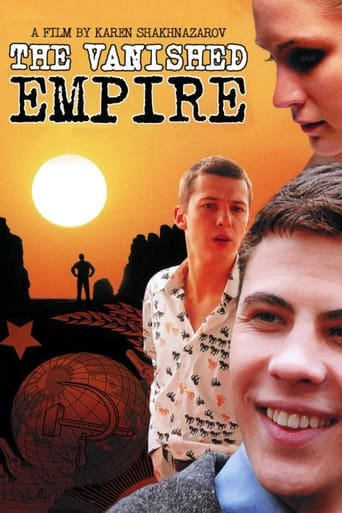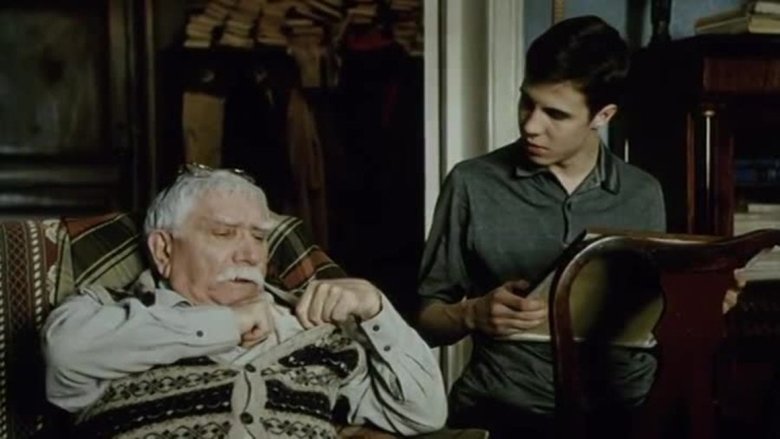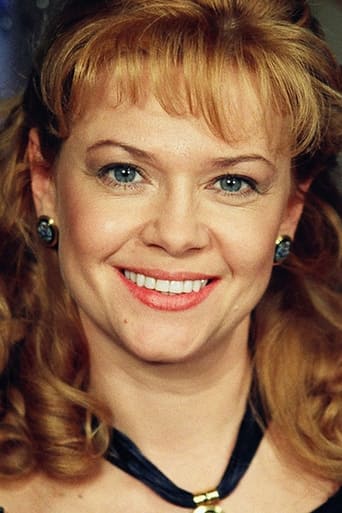Vanished Empire (2008)
This story take place in Moscow during the 1970s and unfolds around the love triangle between two young men and a girl who study at the same university. They argue, make up, and face their first disappointments and victories. While busy with personal lives and loves, they miss foreseeing that the country in which they were born and live will soon disappear from the map.
Watch Trailer
Cast


Reviews
Karen Shakhnazarov's films are all, in a sense, "period pieces." They find a solid place in international film festival culture without ever quite winning the prize. "Vanished Empire" had a particularly personal ring for me, since I began my long-time study in and out of Soviet/Post-Soviet Russia in the period this film depicts (circa 1974), and had an uncomfortably eerie sense of deja-vu throughout the film. Searching for an American parallel, I came up with "American Graffiti," where Richard Dreyfus's character is caught between remaining in his Middle-American hometown or heading off to an Eastern college (as he does) and returning many years later to write about it.Shakhnazarov's film has a similarly autobiographical feel to it, although his young hero ends embracing, rather than rejecting, the culture from which he emerged: the Russian intelligentsia. The meticulous reproduction of the Soviet 1970's offers a vaguely satiric self- portrait, hinting at the educated class's role in preserving world culture and history while rejecting indoctrination into Soviet politics and values. Therefore, the young hero, Sergey's true love is not, as he believes, the "good girl," Lyuda, who prefers the ACTUAL recording of "Swan Lake" (a covert reference to the ballet's role in service to the state) contained in the black market record jacket of the Rolling Stone latest release to the Western contraband recording that Sergey has paid dearly for, expecting to win her affections. Sergey's instinctual pull towards rebellion keep him from romanic fulfillment, but bring him closer to his true self.Instead, Sergey comes to love and honor his dying mother, and follows his grandfather's advice by making a pilgrimage to the archaeological site that represented his family's life's work.In the ancient desert sands, Sergey finds the source of his earlier hallucinatory, drug-induced vision.Emblematic details (cars, records, ancient trinkets) speak to viewers with Shaknazarov's background. Reading them properly, however, requires something of the education Shaknazarov's hero gained in the intervening years between the "coming of age" story and the film's contemporary epilogue.
This is the kind of film which captures the spirit of the age, which gives us an excellent cast playing characters who are all too real, in their world, over 35 years ago. Everything that one could have heard about Leonid Brezhnev's Soviet Union can be found here. Compared to today, it was an era where life was simpler, yet offered far less opportunities than the West. Despite the differences, by the end of this film, it is very easy to relate to the characters, especially Sergei Narbakov, the protagonist, and his friend, Stepan Molodtsov. Our humanity is a shared experience.The outstanding performance by the Armenian actor, Armen Dzhigarkhanyan, must not be overlooked, either. Alternating between old wisdom and very dry humor, he stands out as Sergei's grandfather. I have already recommended this film to friends who share with me an equal curiosity about the USSR, an acronym now consigned to history books.
The Vanished Empire is a beautiful film about Moscow in 1973 when its hero, Sergei Narbekov, is eighteen. Now, he and his cohorts of those days are fifty-three. Not without significance is the fact that Back to the Future is a big hit at the time. Russian kids are in love with jeans, denim, and bootlegged vinyl of the Stones and, judging by Sergei, college is a place to pick up girls you impress by your skill at wangling outlawed or hard to get stuff, including tickets for shows. Getting drunk and going dancing are also high values. Meanwhile, the USSR is full of itself, even if the kids debate whether it might not be much better elsewhere. The empire is in the ascendant but will soon begin to vanish. The film doesn't push this aspect, but hints at it metaphorically. More often it revels in the details of the period, the boastful propaganda signs, the shiny but rickety Russian cars, young hipsters performing covers of western rock and roll, cluttered apartments, people who read. This is clear-eyed nostalgia. The images are lightly tinted in yellow but razor sharp. The only nostalgia is in how well Shakhnazarov has brought everything back to life. Sergei (played by the impressive newcomer Aleksandr Lyapin) is tall and rangy, modeling his up-to-date fashions with slightly geeky panache. He has a fresh choirboy face, but also an air of cynical cockiness. The fresh face it to attract girls, not signify innocence.Sergsi's father and grandfather (Armen Dzhigarkhanyan, an Armenian like the director) were archaeologists. His father's missing, his grandfather (who knew Agatha Christie) is amiably tired of life at home, and indulgent toward the boy -- who steals his books and sells them to buy stuff and get drunk with his best mates Stepan (Yegor Baranovsky) and Kostya (Ivan Kupreyenko). It's essential to understand this film to recognize it's about sowing your wild oats. Decades later the grudges of this moment and its misbehavior won't matter one bit. And due to the resilience of youth, they hardly even matter now.But Sergei's definitely a bad boy, neglecting his studies and, time and again, at key moments in fact, getting drink or stoned and standing up his new girlfriend Lyuda (Lidiya Milyuzina), whose respectable mother he's impressed with is intellectual background. He wants her and loves her but he wants to have fun more. He's unmotivated. When his mother dies of stomach cancer he goes on a trip, a kind of expiation, suggested by his grandfather, to the vast empty site of the ancient City of the Wind, sole remnant of the lost Khorezm civilization his grandfather discovered.That evocative moment ends the vision of 1973 and there quickly follows a short perspective-establishing coda in the Moscow airport today, where the now much older Sergei, whom we don't see, is recognized and approached by Stopya (Stepan), the friend he rejected in a fight over Ludya. Sergei's a translator now. The grudge is forgotten. All that means nothing now.There's a parallel, but never at all pushed, of the lost civilization of the East and the lost Soviet empire. The film, handsome to look at, with a vivid look, is superb as to period mise-en-scene, period (and not just of his own youth) being a penchant of Shakhnazarov, whose position as head of Mosfilm has helped him get funding for such productions. The evocations give a sense of the USSR's high point of self-importance but also of how it was stunted. Now everything is gone, changed, and feels "evil," Stopya says in the airport. Shakhnazarov doesn't have to spell out the differences; the contrast is beautifully sketched in.In retrospect there's a feeling conveyed that the reason Sergei wasn't a good boy is that he saw through the Soviet dream. The Vanished Empire, with its subtly overlapping sense of parallels between lost youth, far off civilization, and crumbled USSR, succeeds in both making eighteen and 1973 clear and vivid and showing that they're gone forever -- that in reliving them for us Sergei is an archaeologist, just like his father and grandfather, after all.
We see few Russian films here in the U.S. and our familiarity with modern day Russian life is limited. Here we get a view of life in the Brezhnev 1970s. "Vanished Empire" reassures us that the Russians are just like everybody else, save for social conditioning and a scarcity of consumer goods. It's convincing characters are warm, animated and full of very familiar foibles. But it is charming how readily family and friends "do" for each other there,enthusiastically.Yet this is a society so parched for Western-style consumer goods that a used Japanese radio can get a buddy out of police custody, a nice jacket plus gas money can induce a cab driver to take someone to the hinterlands and back.Sergey, the focal character, is well and charmingly rendered by young Aleksandr Lyapin. Like a lot of 18 year old college boys he is impulsive and easily suggestible. His romance with girlfriend Lyuda is in full bloom but a call from his comrades can make him forget his commitments to the lady. More than once Sergey shows that loyalty to his buddies trumps faithfulness to his lover.Sergey's inattention to those who love him and his hijinks in school are forgiven, up to a point, because of his youth and charm. But the carefree life and luck of a teenager cannot last. Life becomes serious and the due bill for self-centered presumptions is, inevitably, presented.The women characters in this film are long suffering. Though not ill-treated physically, they are never valued above male comradeship. Their needs are not thought of, or not taken seriously. Lyuda's treatment by Sergey reminded me of the comment of an American exchange student who had boyfriends in the Soviet 1970s. Asked if she ever considered marrying any of them, she said "No." She said that, in Russia, "a woman might be loved but she will never be respected." Jim Smith







